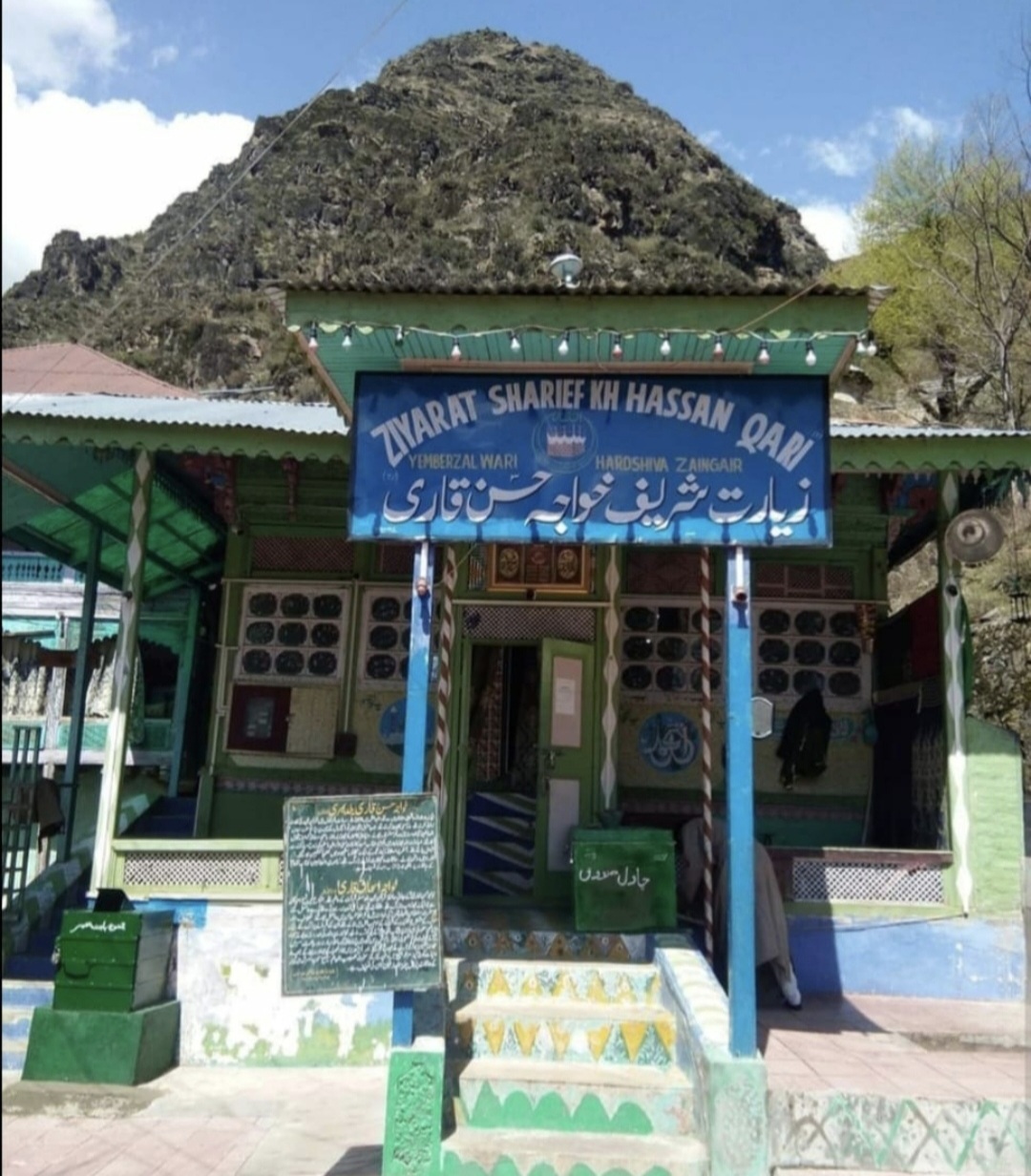Hazrat Khawaja Hassan Qari (RA), a distinguished Sufi scholar whose devotion to Allah and mastery of Qur’anic recitation earned him a place among the great saints of Kashmir.
By Khursheed Dar
Hazrat Khawaja Hassan (RA), affectionately known as Khawaja Hassan Qari (RA) and often referred to with great reverence as “Khawaja Saeb,” stands out as a prominent Sufi scholar and saint within the illustrious Suhrawardiyya order of Sufism. He is highly celebrated for his exceptional skill in the recitation of the Holy Qur’an, which has earned him admiration among countless devotees. His profound mastery of the seven melodious styles of Qur’anic recitation has rightfully bestowed upon him the esteemed title of “Qari.” This title signifies an individual who recites the Qur’an with utmost precision and adherence to the rules of recitation, known as tajwid.
The final resting place of Hazrat Khawaja Hassan Qari (RA) is situated in the lush, verdant woods of a village called Hardu Shiva, which is located a mere 10 kilometers from the picturesque apple town of Sopore. This serene location attracts a multitude of devoted visitors and pilgrims throughout the year, who come to pay their respects and seek blessings.
I owe my gratitude to Dr. Rafeeq Masoodi Saeb, the former Additional Director General of Doordarshan, for encouraging my visit to the shrine of this remarkable mystic and for providing invaluable insights and guidance that facilitated my research into written sources. From these sources, I learned that Hazrat Khawaja Hassan Qari (RA) was initiated into the rich tradition of ‘tasawuf’ under the mentorship of the esteemed mystic Hazrat Sheikh Hamzah Makdhoomi (RA). Born into a noble and well-educated family in the area of Baldimar, Mahraj Gunj, Srinagar, the details of his birth year remain unknown. However, it is well-documented that his mother, a devoted disciple of Hazrat Sheikh Hamzah Makdhoomi (RA), played an instrumental role in shaping his spiritual and religious education. She fervently encouraged him to follow in the footsteps of his esteemed mentor, which led to Khawaja Hassan Qari’s lifelong commitment to the recitation and teaching of the Qur’an to countless individuals.
The author of “Hidayet ul Mukhlaseen” notes that Khawaja Hassan Qari hailed from a distinguished family in Mahalla Baldimar, Mahraj Gunj, Srinagar, where they were engaged in the cloth business. This association likely contributes to his revered title of “Khawaja.” A poignant account provided by his brother, Isaq Qari, in “Chillat al Arifin” recounts a significant event in Khawaja Hassan Qari’s early life. One day, he fell into a state of unconsciousness, causing deep despair among his parents, who feared for his life. In their desperation, his father went to the masjid to implore the imam to pray for his son’s swift recovery. There, he encountered a man engrossed in prayer, and after being advised to share his plight with him, the man accompanied him home. Through this mysterious figure’s miraculous prayers, Khawaja Hassan Qari awoke from his unconsciousness and began to regain his health. Unbeknownst to his family at the time, this man was none other than Hazrat Sheikh Hamzah Makdhoomi (RA), a revered Sufi saint of Kashmir. Following this transformative experience, they invited him into their home and pledged their allegiance to him, marking the beginning of Khawaja Hassan Qari’s spiritual journey under the guidance of this esteemed master.
According to the author of “Tazkir ul Aslaf,” it was indeed his mother’s unwavering dedication to Hazrat Sheikh Hamzah Makdhoomi (RA) that laid the foundation for Khawaja Hassan Qari’s spiritual awakening and education. From the available literature, it becomes evident that Hazrat Khawaja Hassan Qari’s character and personality are truly beyond mere description. Under the guidance of his revered mentor, he renounced worldly comforts and material luxuries, dedicating himself to a life of “zikir e Allahi” (the remembrance of Allah) and fervent prayers, often spending months in meditation without consuming food.
Baba Dawood Khaki (RA) refers to Hazrat Khawaja Hassan Qari in his work “Wird al-Muridin,” noting that, under the tutelage of Sheikh Hamzah Makdhoomi (RA), Khawaja Hassan experienced the profound joy and illumination that comes from the remembrance of Allah. The overwhelming love of the Almighty Allah, the Gracious and Merciful, permeated the very depths of his heart and soul. Acting upon his mentor’s guidance, he chose to settle in Hardu Shiva, located in Zaingair Sopore, where he dedicated his life to guiding numerous seekers along the Sufi path. Notably, he refrained from accepting gifts or monetary compensation from the visitors who sought his blessings. Instead, any offerings that came his way were generously distributed among the poor and destitute, reflecting his deep commitment to the principles of humility and service.
In addition to his spiritual pursuits, Hazrat Khawaja Hassan Qari (RA) was also a learned scholar. His literary work, “Rahat ul Talibeen,” stands as one of his significant contributions to Islamic scholarship. This book not only explores the life and teachings of his revered mentor, Hazrat Sheikh Hamzah Makdhoomi (RA), but also delves into various mystical truths and principles of Tasawwuf. Furthermore, “Rahat al-Talibeen” provides an insightful examination of the diverse practices and paths followed by seekers on their spiritual journeys. According to the author of “Tazkir ul Afireen,” Hazrat Khawaja Hassan Qari (RA) was entrusted with the responsibility of carrying water for his mentor’s kitchen, which served nourishing meals to two hundred Sufi saints. Among these saints, Hazrat Mir Baba Hadar Tulmuli (RA) is particularly noteworthy, as Khawaja Hassan Qari (RA) gained significant spiritual insight from him. It is said that he held the book “Saluk ul Murqabat,” authored by Hazrat Baba Haider Tulmuli (RA), in the highest regard, kissing each page daily as a mark of his reverence.
In accordance with his mentor’s instructions, Hazrat Khawaja Hassan Qari (RA) spent his final days in Hardu Shiva, Zaingair Sopore. The author of “Chalat ul Arifeen” records that he undertook forty solitary retreats, known as “chillas,” in the secluded forests of Zaingair Sopore, deepening his spiritual connection and commitment. Additionally, Khawaja Hassan Qari expressed his spiritual insights through poetry, further enriching the Sufi literary tradition. The author of “Tazkir ul Murshadeen” notes that Hazrat Khawaja Hassan Qari (RA) also penned a history of Kashmir. As a student of history myself, I was intrigued to learn that a Sufi saint had documented Kashmir’s history. Historian Hassan mentions that this manuscript is currently preserved at Oxford University in the United Kingdom and is unfortunately not available in our region.
A number of “karamaats” (miraculous feats) are attributed to Hazrat Khawaja Hassan Qari (RA), showcasing his extraordinary spiritual powers. One such account, recounted by the author of “Tazkir ul Afireen,” tells of a night when he visited Khawaja Hassan Qari’s home. During his visit, he observed several unusual individuals who departed at midnight. Inquisitive about their identities, he questioned Khawaja Hassan Qari (RA), who revealed that one of them was Hazrat Owais Karni (RA), a legendary figure in Sufi tradition. Another miraculous episode involved Khawaja Hassan Qari (RA) and his servant, who was bitten by a snake. Upon hearing his servant’s cries of pain, Hazrat Khawaja Hassan Qari (RA) commanded the snake to present itself before him. To everyone’s astonishment, the snake complied, and upon Khawaja Hassan Qari’s instruction, it extracted the poison from the servant’s leg, resulting in his swift recovery. Historian Hassan remarks that Khawaja Hassan Qari (RA) was indeed a great saint of his era.
According to authentic historical accounts, Hazrat Khawaja Hassan Qari (RA) departed from this world in 999 Hijri and was laid to rest in the tranquil village of Hardu Shiva, Zaingair Sopore. His shrine remains a revered site, hosting an annual Urs (commemoration) on the 27th of Safar, where devotees gather to celebrate his life and teachings.
The views expressed in this article are solely those of the author and do not necessarily reflect the opinions or views of this Magazine. The author can be reached at [email protected]


Leave a Reply